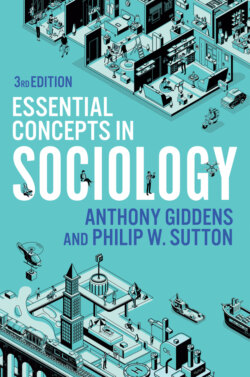Читать книгу Essential Concepts in Sociology - Anthony Giddens - Страница 10
Continuing Relevance
ОглавлениеThe continuing relevance of the concept of a digital revolution should already be clear. However, it is worth noting that contemporary debates have moved beyond simple positive / negative evaluations of digitization. More recent studies reject the idea that cyberspace is essentially different or divergent from the material social world. Empirical studies show that online life is not a denuded form of the material world, but more likely an extension of it. This is clear in research into social media, where it has been found that most people’s interactions are generally with existing friends, relations and people they already know from face-to-face contact, not with strangers and anonymous, ethereal ‘profiles’. Similarly, Baym (2015) argues that a more realistic account shows that relationships today flow from online to offline and vice versa, and, as digital technologies become increasingly embedded within our everyday routines, this is exactly what we might expect.
For sociologists, the digital revolution raises the question of whether existing ways of carrying out research are appropriate for the study of interactions in online environments. Do we now need novel research methods and tools? Selwyn (2019: 2) addresses this issue directly, arguing that, in fact, what we need is a ‘proactive “digital” approach toward all aspects of sociological work’. This is because all social settings have become ‘profoundly digital and digitized’. For example, communications routinely involve texting, email and social media, while many leisure pursuits and entertainment forms, such as gaming, watching films or TV and listening to music, take place online. Scholars working on social and government policy cannot now ignore the vast digital bureaucracies through which education, health and welfare are delivered and accessed. In the future, analysis of the enormous amount of data collected via the Internet of Things may tell us much more about how social life is actually lived than conventional methods such as interviews, focus groups and surveys. In sum, Selwyn’s overall argument is that developing a digital sociology is not an esoteric project pursued by a small number of technology geeks, but is absolutely essential if sociology is to be relevant in the digital age.
